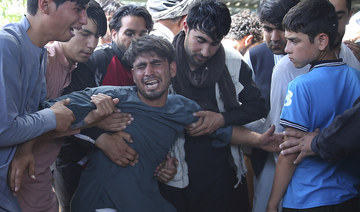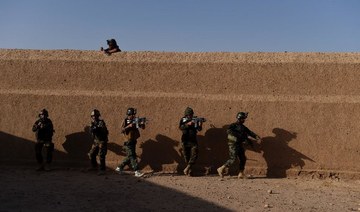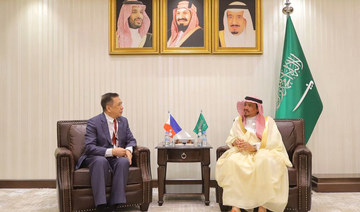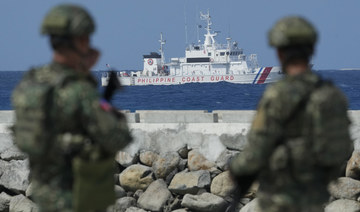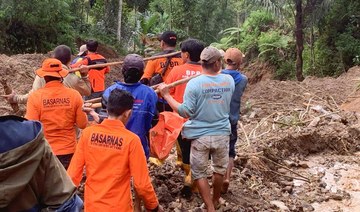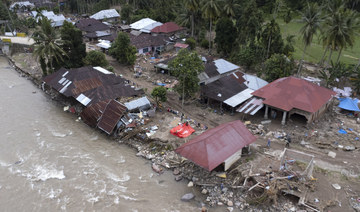KABUL: Afghanistan’s coronavirus crisis has freed young couples in Kabul to consider something that once seemed unthinkable: downsizing their weddings.
Extravagant ceremonies with thousands of guests packed into huge halls serving multi-course feasts are a traditional rite of passage in the country.
Grooms can rack up tens of thousands of dollars in debt, while the opulent wedding halls and their suppliers have long been one of the capital’s few economic bright spots.
But with Kabul on lockdown as coronavirus cases rise, some people have pared down ceremonies that have been in the works for months.
“I have been engaged for the last two years and I was planning to get married in late March,” Latif Faramarz said.
The 26-year-old law student had been preparing to spend around $15,000 and was expecting 1,200 guests but was forced to recalibrate after wedding halls were shuttered in March due to the pandemic.
Faramarz drastically cut the guest list to 40 or 50 people and the cost to around $2,000.
“I’m not excited about downsizing my wedding, they come only once in a lifetime, it’s a joyous occasion. But I don’t have a choice,” he said.
The saving has however opened up other ways for the couple to spend their money and Faramarz now plans to study abroad with his future wife.
“Education is the best tool to climb the ladder and become successful,” he said.
Upending long-planned celebrations also means depriving Afghans — particularly women — of one of their few opportunities to celebrate en masse.
Despite staggering levels of poverty and decades of war, weddings continue to be grand, loud affairs.
Families and friends are crammed into segregated dining halls with occasional low-key dancing, while teams of stressed-out waiters ferry in mountains of food that is quickly devoured at the end of the night.
Photographers swarm around the lucky couple as they enter the hall and pose with family. Women relish the chance to don layers of make-up and wear their finest dresses.
And outside, armed guards keep a careful watch during the festivities, scanning the perimeter of the garishly lit venues that can often be seen from blocks away.
Weddings have been the occasional target of militant attacks, including a Daesh-claimed bombing in August 2019 that killed at least 80 people.
But the threat of violence has done little to temper the appetite for elaborate weddings and the financial reckoning they bring.
The price tag often plunges the poor into debt that they never escape. Grooms are also expected to pay hefty dowries and finance houses or apartments for the bride’s family.
Shir Ahmad — who asked to use a pseudonym — said he was planning to donate some of the extra cash to the poor after he cut his guest list from 1,000 people to 80.
“I wanted to have an extravagant wedding like my brothers, but my dreams have been shattered due to this virus,” said Ahmad, who will now likely host his wedding at home.
“I will donate the money set aside for the wedding to poor people in Kabul. I think it is not worth having a big party like I wished.”
And while grooms might be saving money, the wedding industry in Kabul has been hit hard, putting thousands of jobs at risk and bleeding millions from the economy.
“Our business is suffering,” said Nadir Qarghayee, who runs the wedding halls union in Kabul.
The city alone is home to 124 halls that employ up to 15,000 people, according to Qarghayee.
“It is a big economic blow to all the wedding halls. They have not operated for nearly two months, but they are still paying the rent and the salaries of the personnel and they have no income,” he said.
Holding wedding gatherings at home comes with its own risk of being caught breaking Kabul’s lockdown rules.
“I can have my party now but I think nobody will come,” said Ghulam Sarwar, after he was forced to delay his marriage.
“The government may take action if we have the ceremony and people come together.”
Afghan couples downsize big fat weddings as coronavirus grips
https://arab.news/memyj
Afghan couples downsize big fat weddings as coronavirus grips
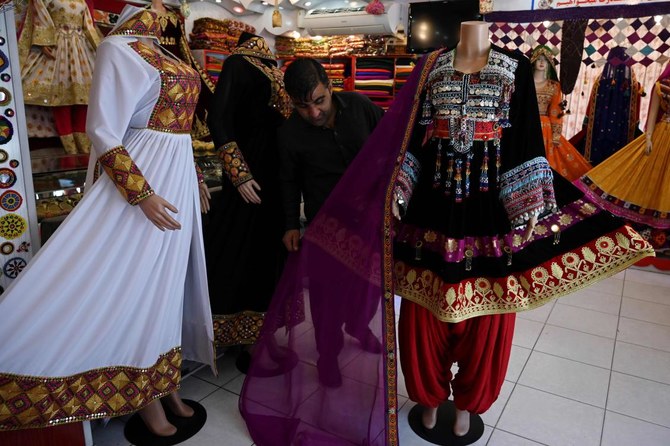
- Despite staggering levels of poverty and decades of war, Afghan weddings continue to be grand, loud affairs
- Wedding industry in Kabul has been hit hard, putting thousands of jobs at risk and bleeding millions from the economy
5,000 Filipino pilgrims expected to fly to Makkah for Hajj

- Travelers ‘can expect VIP-like treatment,’ National Commission on Muslim Filipinos says
- First pilgrims will take off from Manila International Airport next week
MANILA: Thousands of Filipino pilgrims are set to travel to Makkah for the upcoming Hajj pilgrimage, the National Commission on Muslim Filipinos said on Monday, with the first batch set to leave for Saudi Arabia next week.
In the predominantly Catholic Philippines, Muslims constitute about 10 percent of the nearly 120 million population. Most live on the island of Mindanao and the Sulu archipelago in the country’s south, as well as in the central-western province of Palawan.
The commission said that nearly 5,000 Muslims had confirmed they would travel to Saudi Arabia to perform the Hajj pilgrimage this year.
“We have already processed 96 percent of the pilgrims,” Zainoden Usudan, chief of Hajj operations at the NCMF’s Bureau of Pilgrimage and Endowment, said.
“They can expect VIP-like treatment, allowing them to fully concentrate on their pilgrimage.”
Officials from the commission have been working hard to ensure that the difficulties faced by pilgrims last year will not be a problem this time around.
“This time, we are making sure that food will not be a problem,” Usudan said, referring to problems with delayed meal deliveries in 2023.
He said the commission was working with a service provider in the Kingdom that had contingency plans for all aspects of the trip, including transportation.
The first Hajj flight from the Philippines is set to take off from Manila International Airport on May 23.
One of the five pillars of Islam, this year’s Hajj is expected to run from June 14-19. Many pilgrims extend their stays to make the most of the once-in-a-lifetime opportunity to fulfill their religious duty.
Charities brand UK family reunion system for asylum-seekers ‘broken’

- New report says thousands waiting for relatives to be relocated to Britain
- Refugee Council CEO: ‘The UK has clearly failed the Afghan refugees that it promised to protect’
London: Charities in the UK have branded the country’s system for reuniting separated families of asylum-seekers “broken,” calling for the Home Office to “fix and expand” it.
A new report published by the Refugee Council and Safe Passage International has highlighted figures showing a backlog of more than 11,000 migrants in the UK waiting to be reunited with relatives during the summer last year.
Despite repeated freedom of information requests, the Home Office has not provided updated figures since then.
The report mentioned that a particular problem faces separated Afghan families, with many individuals reaching the UK but finding themselves in prolonged legal difficulty and their relatives forced to remain in Afghanistan, neighboring Pakistan or elsewhere.
Currently, Afghans evacuated from their country as part of Operation Pitting in August 2021 are prevented from automatically bringing close family to the UK.
In October 2023, the British government proposed a new system to address this issue, but the plan has yet to implemented despite pressure from MPs and members of the House of Lords.
Approved asylum-seekers can apply for a family reunification visa, but thousands find themselves stuck in a backlog of cases despite the Home Office saying the process should take under 12 weeks.
The Independent spoke to a number of Afghans, including a former pilot, struggling to be reunited with their relatives.
The pilot told the newspaper: “They (his family) have been waiting for a visa for five months in Iran, but so far there is no news from the embassy and there is no guarantee it will be issued.
“My family are facing a lot of problems. They don’t have a proper place to live, and don’t have access to a doctor, because they are living illegally.
“Their Iranian visas have expired and they need to extend them, but it is impossible. My wife is suffering mentally and emotionally, and she is completely (without hope).”
Another issue is that of unaccompanied children who, under current rules, also cannot use their status to automatically relocate their families to the UK.
The Independent spoke to one Afghan teenager, Farhad, rescued from Kabul without his parents in 2021, who faces an anxious wait to see if his family can join him in the UK.
“(The UK government) promised in 2021 that they’re going to bring the families, but it’s still been almost three years,” he said.
“My mum and my siblings are in Pakistan because they needed a doctor and medication. But my father couldn’t get the visa to go with them.
“I am doing my GCSEs this month and I can’t really focus on my studies knowing that my family is struggling.”
Safe Passage International highlighted the case of another young boy, Ahmad, who had tried to join his older brother in the UK.
Despite both his parents having died in Afghanistan, the Home Office denied that he had any “serious and compelling” circumstances to justify his asylum application.
He was only able to stay in the UK after a judge intervened, ordering the Home Office to provide assistance.
Safe Passage International’s CEO Dr. Wanda Wyporska told The Independent: “Nearly three years on, it’s a national shame that Afghans, who risked so much to support UK military operations, are still waiting for a way to bring their family to safety here with them. Their family members are living in fear every day of the Taliban.”
The Refugee Council’s CEO Enver Solomon said: “The UK has clearly failed the Afghan refugees that it promised to protect, by keeping families separated for so long with no information on how they may be reunited.
“After risking everything for the UK, Afghans and their families should not be forced to make dangerous boat journeys to get here, nor should they face hostile, inhumane policies like the Rwanda plan when they do make it to the UK.”
A Home Office spokesperson told The Independent: “We made one of the largest commitments of any country to support people from Afghanistan, and so far we have brought around 27,900 individuals to safety in the UK, including thousands under our Afghan resettlement schemes.
“In October we committed to establish a route for those evacuated from Afghanistan under Pathway 1 of the Afghan Citizens Resettlement Scheme without their immediate family members, to reunite them in the UK.
“We remain on track to meet that commitment and open the route for referrals in the first half of this year.”
Philippines to tighten guard at locations in South China Sea

- Philippine Coast Guard deploys ship to Sabina Shoal on the Spratly archipelago, where it accused China of building an artificial island
MANILA/BEIJING: The Philippines said on Monday it would keep a closer guard on reefs, shoals and islets in its exclusive economic zone in the South China Sea, alarmed by reports of new reclamation activities by China, which Beijing denied.
The Philippine Coast Guard said on Saturday it had deployed a ship to Sabina Shoal on the Spratly archipelago, where it accused China of building an artificial island, having documented what it said were piles of dead and crushed coral on the sandbars.
Jonathan Malaya, spokesperson of the National Security Council (NSC), said NSC chief Eduardo Ano had ordered a tighter guard at locations within Manila’s 200-nautical mile economic zone, as a long-standing diplomatic row with Beijing intensifies.
“No one will guard (these locations) except us. It is our responsibility under international law to guard (them) and ensure that the environment there would not be damaged and that there won’t be reclamation activities,” Malaya told a regular television program.
China claims almost all the South China Sea, including parts claimed by the Philippines, Brunei, Malaysia, Taiwan and Vietnam, and has carried out extensive land reclamation on some islands, building military facilities, causing concern in Washington and the region.
China’s foreign ministry on Monday dismissed Manila’s latest accusation as “groundless and pure rumor.”
“Recently, the Philippine side has repeatedly spread rumors, deliberately smeared China and attempted to mislead the international community, which is futile,” spokesperson Wang Wenbin told a regular briefing.
He urged Manila to “return to the right track of properly settling maritime disputes through negotiation and consultation.”
Philippine Coast Guard spokesperson Jay Tarriela said its presence at the Escoda shoal had deterred China from doing small-scale reclamation, but that scientists would have to determine whether the piles of coral were natural or man-made.
He said the coast guard was committed to maintaining a presence at the shoal, just over 120 nautical miles from the Philippine province of Palawan.
The Permanent Court of Arbitration ruled in 2016 that Beijing’s claims in the South China Sea, a vital waterway, had no basis under international law, a decision that China rejects.
The Sabina Shoal, known locally as Escoda, is the rendezvous point for vessels resupplying Filipino troops stationed on a grounded warship at the Second Thomas Shoal, where Manila and China have had frequent run-ins.
Ano has called for Chinese diplomats to be expelled over the alleged leak of a phone conversation with a Filipino admiral about the maritime dispute.
On Monday, the Philippine foreign ministry said it would look into reports of “illegal and unlawful activities” by diplomatic officials, but did not name China.
3 men charged in the UK with assisting the Hong Kong intelligence service

- The men will appear at Westminster Magistrates’ Court charged under the National Security Act
LONDON: Three men have been charged with allegedly assisting Hong Kong intelligence services and with foreign interference, London’s Metropolitan Police said Monday.
The men will appear at Westminster Magistrates’ Court charged under the National Security Act.
Chi Leung (Peter) Wai, 38, Matthew Trickett, 37, and Chung Biu Yuen, 63, have each been charged with assisting a foreign intelligence service.
“While these offenses are concerning, I want to reassure the public that we do not believe there to be any wider threat to them,” said Commander Dominic Murphy, Head of the Met’s Counter Terrorism Command.
“This investigation remains ongoing, but now that charges have been brought, I urge people not to speculate or comment further in relation to this case.”
Hong Kong’s security bureau, Hong Kong police and the office of China’s foreign ministry in Hong Kong did immediately respond to requests for comment.
Floods kill 43 in Indonesia’s West Sumatra, 15 missing
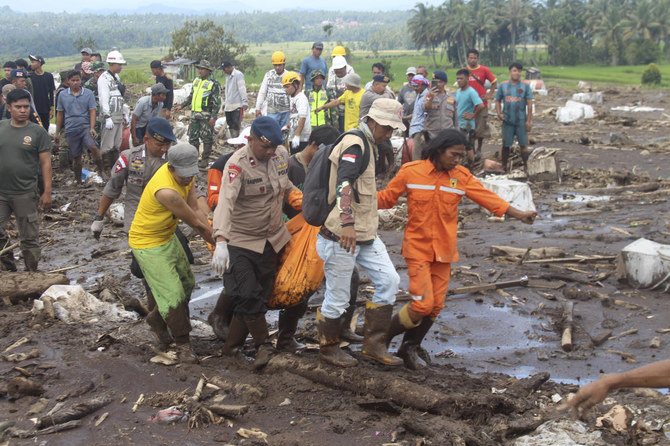
- Torrential rain on Saturday evening triggered flash floods, landslides, and cold lava flow in three districts in West Sumatra province
- Around 400 personnel, including rescuers, police, and military, were deployed to search for the missing people on Monday
TANAH DATAR: Flash floods and mud slides in Indonesia’s West Sumatra province killed at least 43 people over the weekend while a search for 15 missing people continued, authorities said on Monday.
Torrential rain on Saturday evening triggered flash floods, landslides, and cold lava flow — a mud-like mixture of volcanic ash, rock debris and water — in three districts in West Sumatra province, Abdul Malik, chief of the provincial rescue team, said.
The cold lava flow, known in Indonesia as a lahar, came from Mount Marapi, one of Sumatra’s most active volcanoes.
In December, more than 20 people were killed after Marapi erupted. A series of eruptions has followed since.
“The heavy rain swept materials such as ash and large rocks from the Marapi volcano,” said Abdul Malik, who later added in a statement that 43 people had died and 15 remained missing.
“Cold lava flow and flash floods have always been threats to us recently. But the problem is, it always happens late at night until dawn,” he said.
Abdul said around 400 personnel, including rescuers, police, and military, were deployed to search for the missing people on Monday, helped by at least eight excavators and drones.
The national disaster and management agency BNPB said in a statement almost 200 houses were damaged and 72 hectares (178 acres) of lands, including rice fields, were affected. At least 159 people from Agam district were evacuated to nearby schools.
Footage shared by BNPB showed roads and rice fields covered by mud. Video also showed the wreckage of damaged homes and buildings, while the floods brought logs and large rocks into settlements.
Eko Widodo, a 43-year-old survivor, said: “The flooding was sudden and the river became blocked which resulted in the flow of water everywhere and it was out of control.”




